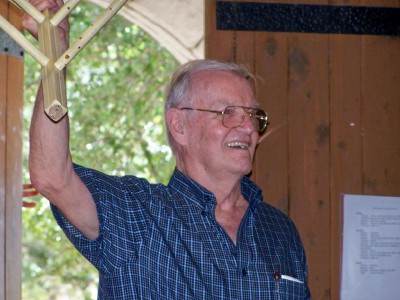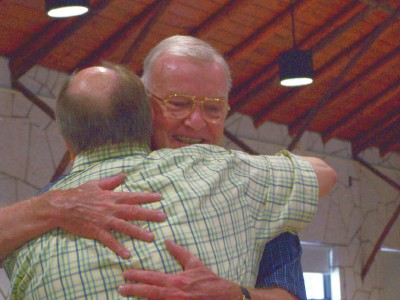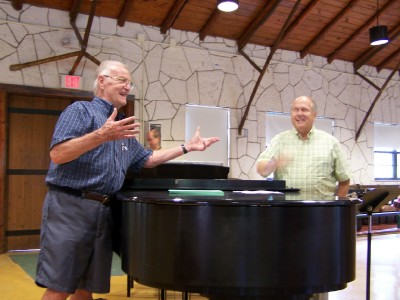 Dr. Robert R. Ball
Dr. Robert R. Ball
YOU ARE MY CENTERFIELDER
Sermon first presented
January 26, 1969
 |
YOU ARE MY CENTERFIELDER
=============================
Text: Philippians 3:12
Sermon by
Dr. Robert R. Ball
Memorial Drive Presbyterian Church
January 26, 1969
Churches all across America today are observing Youth Sunday, a recognition of the place and
importance of young people in the life and work of Christ’s Church. It is my hope that in future years
we will use this occasion as an opportunity for the young people of this church to bring us their own
unique and important witness to their faith in Jesus Christ.
Since there was not time to make such arrangement this year I have chosen to share with you
an insight which a group of young people and I gained together several years ago during a Senior
High Summer Conference. We were studying Paul’s letter to the Church at Philippi. We came to this
verse which is our text this morning. At first it seemed quite strange and confusing, but in our
discussion an illustration emerged which seemed helpful.
It is a true story about a baseball player who several years ago was a sensational rookie with the
minor league Minneapolis Millers. His batting average was well over 400 and his fielding was
phenomenal. In midseason he was called up to the parent club, what was then the New York Giants.
Still in his teens, the young rookie found himself patrolling centerfield in the Polo Grounds, one of the
largest outfields in organized baseball.
It was a dream come true. But before long it was a nightmare. After more than a month, his
batting average was less than his weight. He hadn’t had a hit in his last 29 appearances at the
plate. His vaunted home run production stood at zero. Ever since his days at the Negro shacks
of Alabama, this rookie had dreamed of the big leagues. Now he was there but he was a failure.
The boy sat in front of his locker and wept. He was through. he was ready to go back to the
minors. At that moment, Leo Durocher (then manager of the Giants) came in and sat beside him.
Putting his arm around the boy’s shoulders, he said “Son, you are my centerfielder.”
At the bleakest moment of his dispair and shame, the boy was told that he didn’t have to do
anything to prove himself worthy of what he wanted to be. By his manager’s choice, he already
was centerfielder.
Released from the tightening, disabilitating fear of losing his job, the boy was free to turn all
of his energies into learning that job. Because he didn’t have to fear that a strikeout might end his
career, he was free to swing away for a home run. because he knew that his manager believed in
him, he was able to develop a sense of confidence and respect for himself. Because his manager
had made him centerfielder, he could set himself without fear to the task of becoming the
centerfielder he already was.
Whether you are a baseball fan or not, you know the name of Willie Mays. From one end of
this country to the other, baseball men agree that he is one of the greatest players of all time.
No one knows what might have happened if Willie had gone back to Minneapolis. But he didn’t
go back. And what happened is a matter of record; Willie Mays is a super-star.
I know there are lots of things wrong with this example – like, who ever heard of suggesting
that Leo Durocher is anything like God! But there is also a point to be gained here – a point that
is central to our understanding of the Christian faith. YOU AND I ARE FREE TO GROW AND
DEVELOP INTO THE PERSONS THAT GOD CALLS US TO BE, PRECISELY BECAUSE WE
ALREADY ARE, BY HIS CHOOSING, HIS LOVED AND PRECIOUS CHILDREN. This is what
Paul is saying in our text . . . .
“Not that I have already obtained this or am already
perfect, but I press on to make it my own because
Christ Jesus has made me his own.”
Let me mention three practical implications of this text for our lives.
I.
In the first place, it is the fear of failiure which holds us from so many of our goals. So long as
Willie Mays was possessed by the fear that he might not make it, he couldn’t do what he really
could do. This isn’t double-talk. Fear is powerful enough to keep us from being what we are. I have
seen young people who were so afraid of being disappointed later that they refused to be enthusiastic
now about something that pleased them very much. Fear keeps them from being as happy as they
really are. I have seen people so afraid they would not be liked or appreciated that they refused even
to try to be friendly or to make friends. Their fear of the possibility of rejection held them from the
friendship for which they yearned. I have seen salesman so afraid that their offer would be rejected
that they went to see the prospective buyer angry before he said a word. I have seen parents who
were so fearful that they could not do a good job of rearing their children that they lived out the very
failure which they feared.
A group of parents in Southern California has been meeting weekly for several months with a
psychiatrist to discuss the problems of being parents. In their study they came to two conclusions:
first, that what their children need more than anything else is warm and consistent love and, second,
that they simply were not capable of that kind of love. They went home that night very discouraged.
When they met again the next week, no one had much to say at first. Then one woman,
gathering up all her courage, came forth with this:
“It’s strange, I know, but we’ve had a better week
together in our family than we’ve had in a long time.”
One by one the others all began to chime in. The same had been true for all of them. What they
had discovered was that when they gave up trying to prove that they were something they were not
(perfect parents), they were free to do and be what they really were – human beings – and what they
really were proved to be enough.
Surely this is an example of the grace of Jesus Christ. God does not set before us a stereotyped
pattern of behavior to which we are expected to conform. What he sets before us is his Son – an
accepting, understanding love. Christ has not come to bring us more fear; we have enough of that.
He has come to bring us freedom – the freedom that comes from knowing that we are loved and
precious as we are. Because God loves us as we are, we are free to become even more – to swing
away for a home run.
II.
This leads to my second point. It was at the very moment of Willie’s greatest sense of failure
that his manager said to him, in essence, “I believe in you.” Durocher was not blind to the fact of
Willie’s poor showing, but he saw in Willie the potential for greatness. He knew the greatness of
which Willie was capable better than Willie knew it himself. Durocher was willing to stake his
professional life on that confidence, and knowing that someone had that much confidence in him
was what gave Willie confidence in himself.
In spite of our records, Christ says that “failure” is not the last word about us. He knows us
better than we know ourselves. Scripture says:
“While we were yet sinners, Christ died for us.”
Jesus Christ believes that we are destined for greatness as persons, as ones who are capable
of receiving and giving love which is what it means to be a person. He believes in us so much that
he was willing to bet his life on us. If we give up on ourselves, this is the same as saying that we
believe Christ died in vain.
When we know that God himself believes in us, we have the courage to run the risks which are
a necessary part of growing to maturity. It is the child who is not afraid he will be humiliated if he falls
off his bike, who climbs back on and keeps trying until he masters it. It is the child who, as we say,
thinks everyone loves her, who finds that her experiences by and large confirm the fact that they do.
It is the person who is willing to accept the possibility and disappointment of failure who makes the
important discoveries and achievements.
Christ tells us that our success as persons is already settled in the only way it ever can be – we
are loved and precious to God. Knowing that, our setbacks, and even our failures, become the
opportunities for new growth.
Scripture gives us a perfect example. It was Peter who denied Christ three times. Peter not only
failed, he failed at a crucial moment when Jesus was on trial for his life. But we cannot help but note
that Peter was the only one of the Apostles who was even near the spot where Jesus was being tried.
The others did not fail, but they were not present where the risks were being run and the tough
questions asked.
This does not excuse Peter’s failure. It was such an abominable thing that afterward he went out
and wept bitterly. It was a failure.
But Peter was so sure of his standing with Christ, so committed to his love, that he was willing
to follow even if it meant running the risk of failure. At Pentecost, when the Church of Jesus Christ
was born, it was Peter who preached the first Christian sermon. Weak and fickle Peter grew into
greatness because he did not permit his failure to be the last word about his discipleship with Jesus
Christ. God’s love is more powerful than our failures.
III.
Finally, we must recognize that this is a dangerous gospel to proclaim. If people find out that God
already loves them as much as it is possible to be loved, they may quit trying. As W. H. Auden wrote
in his Christmas Oratorio,
“God likes forgiving and I like sinning. Where can
you find a better arrangement than that?”
If people knew it wouldn’t make any special points for them in heaven, maybe no one would be
willing to accept the responsibility of teaching Church School anymore, especially if it came at an
inconvenient hour. Maybe people would quit giving their money to the church. Maybe folding chairs
would end up staying folded. And maybe this preacher would end up without a job.
But “goofing off” has never been the reaction of those who have seriously and correctly heard
the gospel. An opposite reaction is more nearly the case.
People seem to have the impression that flaunting God and the whole purpose and meaning of
life is fun. That’s like assuming that Willie Mays found it to be more fun to strike out than it was to
play the game as it was supposed to be played. just because he was assured of his job, Willie didn’t
begin to loaf. Far from it! This was his opportunity to be what he was destined to be.He wasn’t about
to muff it by taking it for granted. Willie used his freedom as an opportunity to grow into what he
really was.
If a ball player has this reaction because his manager believes in him, how should we react to
the knowledge that the God of all creation believes that we are of infinite worth – worth the giving of
his life? The freedom which is ours in Christ’s love both permits and inspires a greater and more
productive effort than we have ever made before. The difference is that now, instead of trying to
impress someone, we can get on with the real business of being useful in the lives of others.
This past Christmas Eve, the young people of a particular Presbyterian Church in the Midwest
were responsible for the worship service for the entire congregation of that church. They took their
responsibility seriously. For weeks they worked hard writing and revising their script, selecting and
rehearsing the music. Their pastor worked with them as an advisor, but it was strictly the young
people who poured their faith and creativity into the planning.
On Christmas Eve the sanctuary was filled to overflowing. The service was different, the music
unusual; but the message was loud and clear. The closing hymn was more traditional. The
congregation stood to sing the familiar “Joy to the World.” But as the last stanza began, the young
people of the church left their places in the chancel and choir loft. They went out into the congregation
smiling and shaking hands with all the worshippers.
Those good and proper Presbyterians were a little unnerved at this irregular, uncustomary behavior;
but as the young people went on through the entire congregation, a perceptible change began to occur.
There were more smiles; parents gripped their children’s hands a little harder. “Joy to the World” has
never been sung with more enthusiasm or conviction. The message that Christ brought into the world
at Christmas was being communicated with radiance and eloquence through those 20th century
teenage disciples. That message might have been worded something like this:
“Not that we have already obtained this, or are
already perfect, but we press on to make it our
own because Christ Jesus has made us His own.
Won’t you join with us in this exciting opportunity?”
Interesting to remember that this January 26th, 1969 sermon was months before the arrival of Allen Pote and the advent of the Joyful Noise choir. Is it possible that Dr. Ball had something in mind on that Youth Sunday that we were yet to understand? Something that has changed our lives and the lives of all those with whom we have come in contact for the past fifty years? In the process of typing this out again, Mom can attest to the feeling that indeed, the pastor had something up his sleeve besides his arm.
|
 |
Photos of Joyful Noise/Joyful Echo Reunion, August 6-9, 2010
Allen Pote and Robert R. Ball
The instigators.
 |